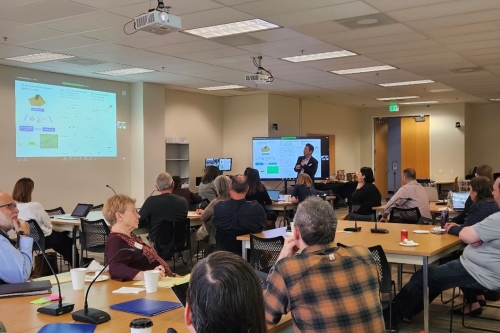The National Science Foundation (NSF)-funded Smart and Connected Communities (SCC) Project team, led by CEE Professor Kenichi Soga, CITRIS scholar Louise Comfort, and post-doc Seunghyun Lee, organized two kick-off community workshops to promote collaboration and engagement. These workshops took place on February 15th at the East Bay Municipal Utility District's headquarters office in Oakland and on May 10th at the Marin Wildfire Prevention Authority in San Rafael, Marin.
Participation in the workshops was diverse, with representatives from various organizations, including public agencies, utility companies, and community-based organizations serving Alameda and Marin counties. The interdisciplinary and multicampus University of California research team introduced the project and facilitated introductions between community partners. Additionally, they learned about additional potential stakeholders from the community who can contribute to the project, building a network of organizations engaged in collective cognition and actions to address the challenges of wildfire risks.
Building on the community workshops, the research team was invited to present an overview of the project at two subsequent events. Firstly, they presented at the Alameda County Emergency Managers' Association (ALCO EMA) meeting on May 24th at the Alameda County Office of Emergency Services in Dublin. Secondly, they shared their work at the Civil Air Patrol's meeting in Oakland on June 6th.
Looking ahead, the research team is planning additional community workshops in the fall to obtain feedback from communities about the research team's work progress. These workshops will focus on presenting the team's work progress on developing the socio-technical Digital Twin, integrating wildfire simulation models, infrastructure systems, and networks of communication. Furthermore, they aim to showcase examples of a 'serious game,' that is, an interactive application to explore alternative actions in possible scenarios of wildfire risk that can be played on a smartphone or iPad and used as educational material to raise the level of community awareness and capacity for collective action.

